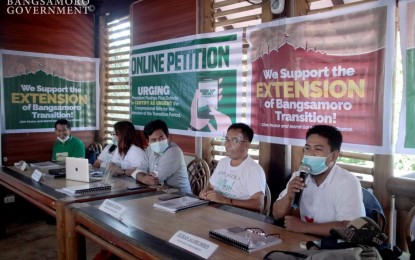
SNOWBALL. Members of Mindanao's civil society launch an online petition urging President Duterte to support legislative measures aimed at extending the Bangsamoro transition period from 2022 to 2025. The campaign has earned more than half a million signatures as of March 2. (Bangsamoro Information Office)
COTABATO CITY – A longtime Islamic intellectual has joined a growing public sentiment to extend the period within which the newly-established Bangsamoro Autonomous Region in Muslim Mindanao (BARMM) may transition towards full fruition.
The extension of the transition period, from 2022 to 2025, is being pushed in order to enable stakeholders in both the BARMM and national government enough time to address their priority concerns.
“I think 2025 is only fair considering the short time it requires them to accomplish (their tasks) including the question of normalization, which i believe requires more than three years,” said Moner Bajunaid, a former Chancellor of the Mindanao State University in Gen. Santos City.
He added that given the current circumstances of the BARMM and the shift of the Moro Islamic Liberation Front (MILF) “from a revolutionary group to a new democratic leadership, the group needs an (ample) period for the transformation.”
Bajunaid, a former professor of Islamic Studies, added that the former combatants “need to adjust to all the aspects of governance. They are yet to complete and finish the education code, the GAD code, and so many others.”
The historic peace agreement, which eventually birthed the BARMM, may have been signed in 2014 but full decommissioning of the former armed group, the conversion of what used to be guerrilla camps into productive estates, and the sheer task of civilian governance are just some of the practical challenges that now confront the former combatants.
Elections within the new autonomous region will likewise be moved should the transition date be extended. This will allow the regional electorate to mature enough to choose competent and responsible leaders, observers note.
In fact, “a democratic system will allow the best of people to participate in the process of governance,” added Bajunaid, who once served as Commissioner of the National Commission on Muslim Filipinos.
To date, five bills are pending in Congress pushing for the extension.
Supporters of the extension have included a range of personalities from politicians to church leaders, from grassroots volunteers to organized groups.
Some of them are governors Mamintal Alonto Adiong, Nancy Catamco, Haji Yshmael I. Sali, and Bai Mariam S. Mangudadatu of the provinces of Lanao del Sur, North Cotabato, Tawi-Tawi, and Maguindanao, respectively.
Joining them are Rep. Abdulmunir Arbison of the 2nd District of Sulu, as well as Mayors Datu Shamim Mastura, Rosita Furigay, and Magul U. Gandamra of the cities of Sultan Kudarat, Lamitan, and Marawi.
Cardinal Orlando Quevedo, OMI, Archbishop Emeritus of Cotabato, also issued a statement of support.
Public demonstrations were also held across various locations within Muslim Mindanao. One of these was a “peace caravan and rally” held in Jolo, Sulu spearheaded by the Save Sulu Movement.
A petition for signatures addressed to President Duterte is also being circulated by a group called the CSO Movement for Moral Governance.
In furtherance of multisectoral focus group discussions earlier conducted in at least five Mindanao provinces and three cities, volunteers in Zamboanga City held a “MultiStakeholders Dialogue and Consultation on the Bangsamoro Transition Period.” (PR)
